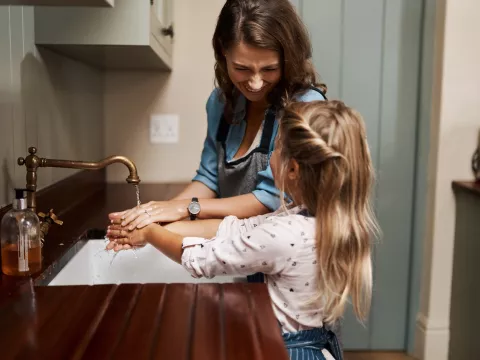- AdventHealth

Choose the health content that’s right for you, and get it delivered right in your inbox.
Kids love to touch and feel the world around them. They explore new objects, play with unfamiliar toys and cherish favorite stuffed animals all while using their hands. They show their affection and love with hugs and kisses. Those sweet hands are full of love and learning. They’re also full of germs — germs that are spread and shared swiftly between friends and family members.
Help keep your child healthy and happy by encouraging proper handwashing at home, school and while out and about.
Hand-washing Dos
Believe it or not, there’s a right way to wash your hands. The Centers for Disease Control and Prevention (CDC) outlines five specific steps to rid your hands of harmful germs and bacteria. Teach your child proper hand-washing technique:
-
Wet hands with clean, running water, turn off the tap and apply soap.
-
Lather hands by rubbing together with soap. Be sure to get the back of hands, between fingers and under the nails.
-
Scrub hands for at least 20 seconds — as long as it takes to sing “Happy Birthday” twice.
-
Rinse hands under clean, running water.
-
Use a clean towel to dry hands.
Make Hand Hygiene Stick
Even when kids know the right way to wash their hands, you can’t be sure they’ll always follow through. With flu season coming, get kids to wash their hands properly every time with a few simple tips.
Show Them the Science
Kids love science experiments. Pull together a couple quick and easy activities to show them the importance of handwashing. One easy experiment includes ingredients you already have at home:
-
Hand Soap
-
Three Sandwich Baggies
-
Three Slices of Bread
Have kids handle a piece of plain bread before they wash their hands. Pass it around and let them touch the entire surface. When finished, place the bread in the sandwich bag and let it sit on the counter. Be sure to label each bag so you know which piece it is.
Next, have kids wash their hands as they normally would. Then, pass around the second piece of bread, once again allowing each child to touch the entire surface of the bread. Put the bread in a sandwich bag and set it next to the first slice of bread on the counter.
Finally, send them back to the sink and have them wash their hands with the five steps outlined by the CDC. Pass the third piece of bread around, and then put it in the final sandwich bag. Let the bread sit on the counter for a few days. Encourage children to check out the status of the bread and discuss any difference between the three pieces of bread.
Get a Fun Soap
Head down the soap aisle and you’ll see all the options available today. From foam to no foam, clean or fruity scents and favorite characters, chances are there’s a soap your kid will love to use. If your child needs extra motivation, try something even more special, like a soap that changes color after your child scrubs hands, or an automatic soap dispenser with a timer.
Make It Routine
Handwashing should be something kids don’t even think about. Make it a habit in your family so your kids know they need to wash hands whenever they:
-
Eat
-
Get home from school, playdates or practice
-
Sneeze or cough on their hands
-
Use the restroom
Create a Kid-Friendly Hand-washing Station
Put everything your child needs to wash their hands properly within reach. That may include:
-
A colorful towel
-
Cute poster to remind them to wash before leaving the bathroom
-
Fun soap
-
A stool to reach water taps, soap and towel without help
-
A timer or hourglass to remind them how long to scrub
Good Health Is in Your Hands
Science shows that spending time to teach your children proper hand hygiene is well worth it. Handwashing can prevent one in three diarrhea-related illnesses and one in five respiratory infections, including the cold or flu.
Get your kids on board with handwashing, so you can keep them healthy and happy. And if you haven’t already, talk to your primary care physician or pediatrician, or make an appointment at AdventHealth Centra Care, to get this season’s flu vaccine – the best protection against this illness.




